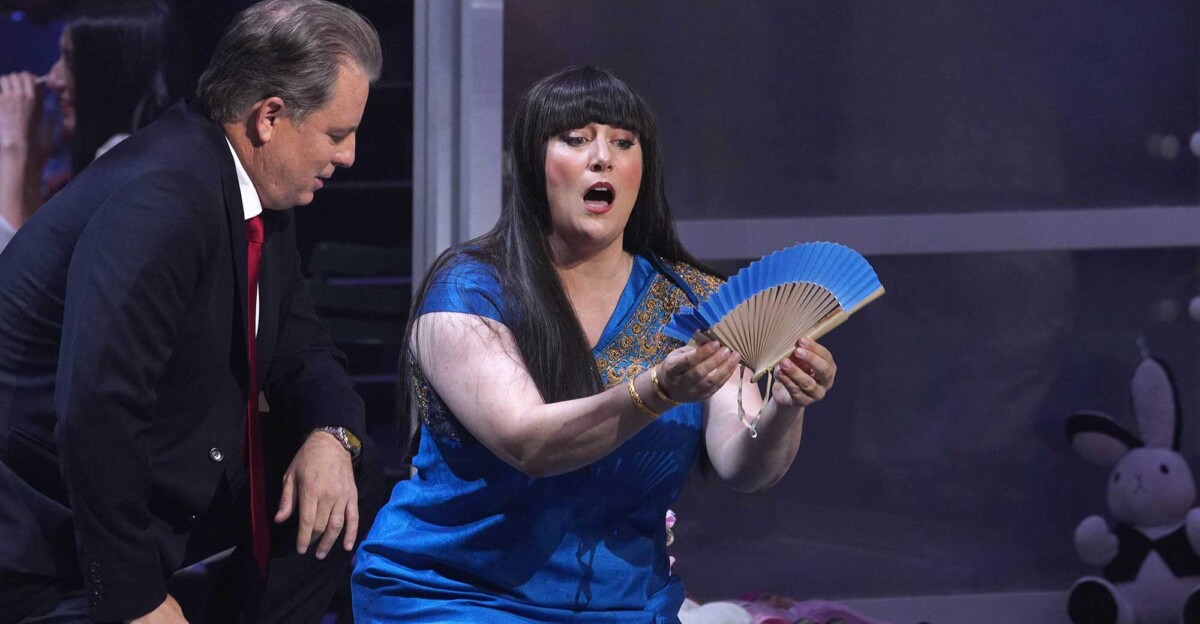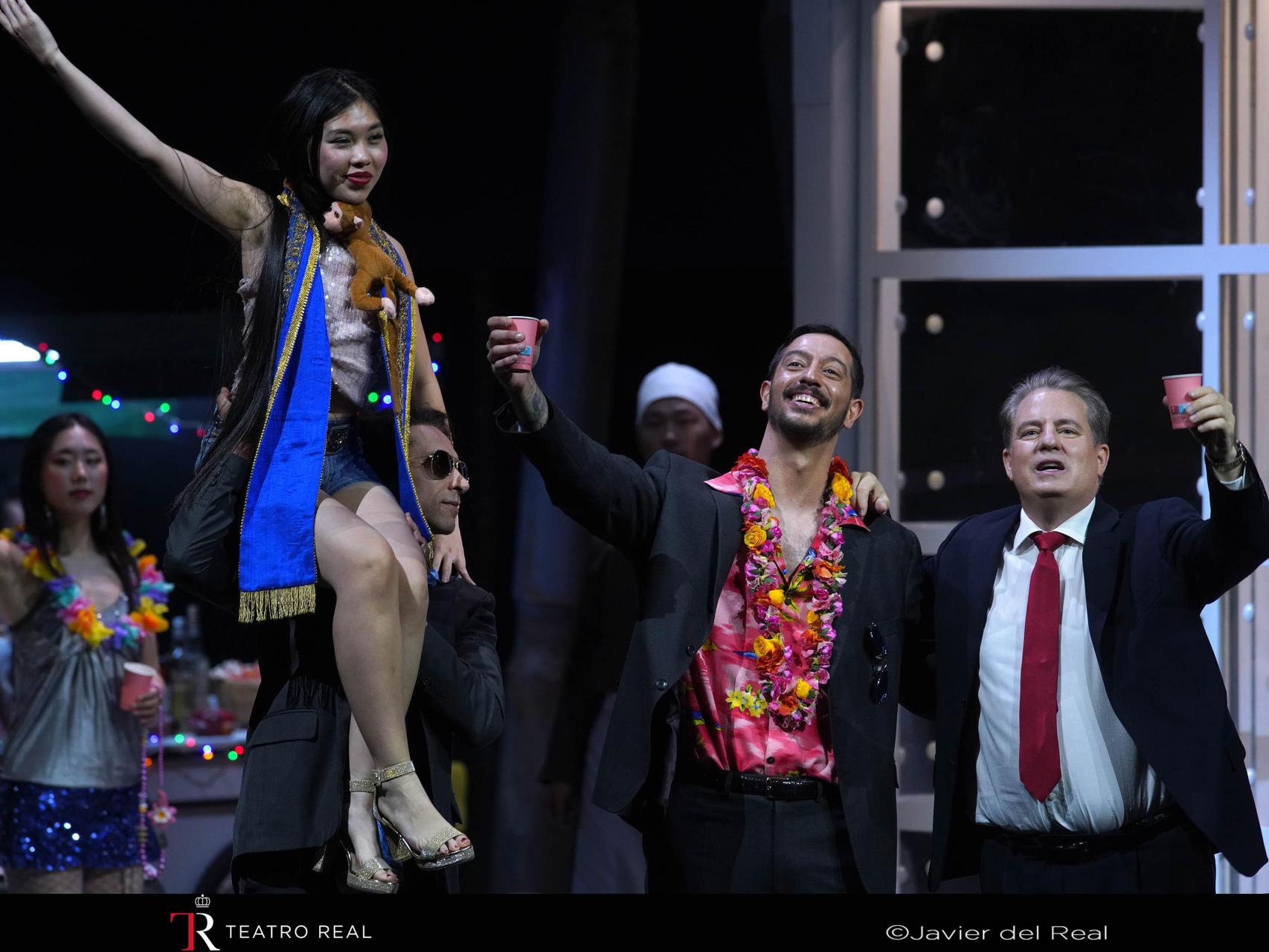Madrid, July 19, 2024.
Saioa Hernández finally has the constant presence she deserves at the Teatro Real. In recent years, this soprano has sung there operas such as Un Ballo in Maschera, Nabucco, Turandot, and this year, Madama Butterfly. Montserrat Caballé, one of her singing teachers once stated that "she should sing in every opera house". Prediction fulfilled, since Hernández has sung on multiple European stages, mainly singing operas by Verdi and Puccini, being the most important Spanish soprano for this repertoire. At the Teatro de la Zarzuela, she sings every year, since our lyric genre is one of her great specialties. Aged only 45, she still has many glorious nights to offer us. As mentioned before, this year she sings Madama Butterfly at the Teatro Real, and she will do so in Barcelona by the end of this year. However, due to health problems, she had to cancel two of her seven scheduled performances, in order to recover and, with the professionalism that characterizes her, sing the last two, including last Friday's one.
Considering this health issue has been so recent, and despite this, Hernández has sung a beautiful and tragic Butterfly, in a shining portrait, despite the fact that her dramatic tone is now more suitable for roles such as Tosca, Turandot or Verdi roles than Cio-Cio-San. However, her portrait of this role is so convincing, so exquisitely sung, that she wins over the audience. Her smiles, Her gestures, their despair and her way of crying in the final scenes convey the moods, emotions of Cio-Cio-San, who despite all her suffering and her quick transition to adulthood, she is still much of a teenager.
From her entrance in "Ancora un passo or via" she surprised with a warm voice, a dramatic voice, but transmitting the candor of the character. Possibly they are still affected, but the high notes have som impact, as in "Amore mio" when Cio-Cio-San reveals she has changed his religion, and hugs Pinkerton. In the love duet, the warm, dramatic tone that we recognize in Verdi's operas makes it suitable for this piece. In the second act, the famous Un bel di vedremo aria was performed beautifully, in a sensitive, mature, dramatic rendition. In the scene with Yamadori, when she tells her what divorces are like in America, she is hilarious at imitating the judge and the husband who wants a divorce. And equally beautiful was the interpretation of "Che tua madre dovrà". Caballé's influence is noticeable in his way of intoning the bass, both in the phrase "sua grazia se ne va" and in "morta, morta", It is in this act and especially in the third one in which Hernández's voice feels more comfortable. Without a doubt, the best moment was the end, in the famous final aria "Tu, tu, piccolo iddio", where her voice sounded powerful, the volume surpassing the orchestra (when up to that moment there were some moments in which her voice was the surpassed one), showing her vocal power and her dramatic tone, which becomes so heartbreaking.
Matthew Polenzani has sung the brainless, despicable B.F. Pinkerton. This American tenor has a powerful voice, which can be heard, but the tone, which is intended to be lyrical, the higher the tone goes, the less pleasant it sounds. Even so, in the first act he was more inspired than in the third, although in the Addio Fiorito Asil, he began singing on the piano, something interesting considering Pinkerton's state of fear and remorse in that scene.
Lucas Meachem played Sharpless. The voice is good, it has an appreciable sound and a beautiful tone, showing experience, but he lacks some volume.
Silvia Beltrami was a wonderful Suzuki, with a beautiful voice and a beautiful velvety timbre. Her best moment was in the third act, with a resounding low voice in the heartbreaking words "Che giova? Che giova?" and a pianissimo in "Oh, me trista!", when she discovers Pinkerton's plans.
The rest of the cast, like the performance discussed on Sunday 15th, was at the same level, highlighting once again Mikeldi Atxalandabaso's Goro, with a stronger voice and a more confident projection than Polenzani's, the leading tenor.
Nicola Luisotti, conducting the Teatro Real Orchestra, was at the same level than on last Sunday, alternating powerfully conducted moments with ones more focused on just accompaniment. Again, the brass sounded like Wagner, in "Dite al babbo scrivendogli che il giorno del suo ritorno...", and then the brief concluding orchestral music sounded a little fast, depriving a bit from the power of the scene. The chorus is equally excellent, now highlighting the female chorus in the first act.
Little more to add about Damiano Michieletto's staging, I have already told everything in my last Sunday review.
The theater was not full, although it was more occupied than last Sunday. Tickets were even given to the Under-35 Friends of the Teatro Real, for free. However, despite this magnificent idea, the empty seats seen are not very comprehensible for such a popular opera like this. There were outstanding ovations for Meachem, and especially for Hernández, to whom the public showed their gratitude and affection. The last performance will take place tomorrow (July 22nd), to conclude a season in which we have enjoyed a triumphant spring dedicated to 20th century opera, with critical and sometimes even public success, to end it with a well-served Wagner's Meistersinger and now, a Butterfly with four casts of the highest international level. Now it is time to rest, from September on, the 2024-2025 season is waiting for us, with new emotions, with recitals by Flórez, Netrebko and Adriana Lecouvreur featuring Ermonela Jaho and Elina Garanča. Cannot wait!





No hay comentarios:
Publicar un comentario